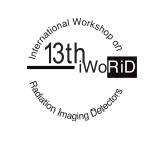Speaker
Mr
Jiaguo Zhang
(Institute for Experimental Physics, Hamburg University)
Description
The European X-ray Free Electron Laser (XFEL) will deliver 30,000 fully coherent, high brilliance X-ray pulses per second with duration below 100 fs. This will allow to record diffraction patterns of single molecules and study ultra-fast processes. Silicon pixel sensors will be used to detect the diffraction images. In 3 years of operation the sensors will be exposed to doses of up to 1 GGy of 12 keV X-rays. At these X-ray energies no bulk damage in silicon is expected. However fixed oxide charges in the SiO2/Si3N4 layer and interface traps at the Si-SiO2 interface will build-up.
We have investigated as function of the 12 keV X-ray dose the microscopic defects in test structures and the macroscopic electric properties of segmented sensors. From the test structures we determine the oxide charge density and the density of interface traps as function of dose. We find that both saturate (and even decrease) for doses above a few MGy. For segmented sensors the defects introduced by the X-rays increase the full depletion voltage, the surface leakage current and the inter-pixel capacitance. In addition an electron accumulation layer forms at the Si-SiO2 interface which increases with dose and decreases with applied voltage. Using TCAD simulations with dose dependent parameters obtained from the test structures, we are able to reproduce the observed results. This allows us to optimize the sensor design for the XFEL requirements.
In addition the Si-SiO2 interface has been studied by time resolved signals induced by 660 nm laser light, which has a penetration of about 3 micrometer in silicon. Depending on the biasing history, humidity and irradiation dose, losses of either electrons or holes or no charges losses are observed. The relevance of these results for sensor stability and performance is under investigation.
Keywords: XFEL, silicon pixel sensor, radiation damage, TCAD simulation and charge losses.
Authors
Mr
Eckhart Fretwurst
(Institute for Experimental Physics, Hamburg University)
Mrs
Ioana Pintilie
(National Institute of Materials Physics, Romania)
Mr
Jiaguo Zhang
(Institute for Experimental Physics, Hamburg University)
Mr
Joern Schwandt
(Institute for Experimental Physics, Hamburg University)
Mr
Robert Klanner
(Institute for Experimental Physics, Hamburg University)
Mr
Sergej Schuwalow
(Institute for Experimental Physics, Hamburg University)
Mr
Thomas Poehlsen
(Institute for Experimental Physics, Hamburg University)
